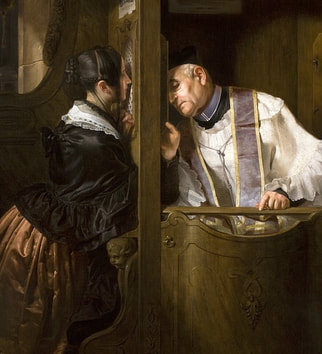THE SACRAMENT OF CONFESSION

Confession, also commonly referred to as the Sacrament of Reconciliation, is the rite by which sins are confessed and forgiven. Just like in Mary Magdalene's encounter with Christ, this sacrament allows us to experience the awesome mercy of God. When we come to confession, through the words of absolution, God offers us a fresh new start as we are restored to our original state when we were reborn in font of baptism.
When should I go to Confession?
The Church encourages us to make a frequent Confession as the sacrament does not only wash away our sins but also helps us to grow in our relationship with Christ. Frequent examination of conscience also allows us to become more aware of our own frailty and more reliant on God's grace and strength. We also should make sure that we go to confession as soon as we find ourselves in a serious sin, especially since we cannot approach the Eucharist until we have received absolution.
When should I go to Confession?
The Church encourages us to make a frequent Confession as the sacrament does not only wash away our sins but also helps us to grow in our relationship with Christ. Frequent examination of conscience also allows us to become more aware of our own frailty and more reliant on God's grace and strength. We also should make sure that we go to confession as soon as we find ourselves in a serious sin, especially since we cannot approach the Eucharist until we have received absolution.
Frequently Asked Questions
What if I haven't been to Confession for a long time?
Going to Confession can sometimes make us feel nervous, especially if haven't been for a long time. This is all very natural and it certainly shouldn't discourage us from going. Jesus reminded us that “heaven rejoices more for one repentant sinner than for 99 righteous persons who never needed to repent.” The Sacraments of Reconciliation is a celebration of God's infinite love for us. Whether it's been a few month, two years or a decade since our last Confession, there is no need to worry. The only thing that we will be faced with in the confessional is God's mercy. Please do not delay any longer — just go! The priest will be very happy to help you even if you no longer remember exactly what to do.
What if i still feel nervous?
Remember, first, that in the sacrament you are fundamentally talking to God through the priest. God loves you, wishes to forgive you, and desires to embrace you with the joy with which the prodigal son was embraced in Jesus’ parable (Lk 15:11-32). Moreover, know that you will not say anything that the priest has not heard before. Do not be afraid. If you are nervous, please just tell the priest that you’re nervous and he will help you.
How do we celebrate this sacrament?
The sacrament is celebrated in an one-to-one encounter with a priest - either behind a grill (so that the priest cannot see you) or face-to-face. It is essential to note that whatever is said in the confessional is strictly between the penitent and God and the priest cannot reveal anything under ANY circumstances (this is called the 'Seal of Confession').
How do I make a good confession?
Here are some basic steps:
- Examine your conscience - what sins have you committed since your last good confession?
- Here is a guide to help examine your conscience.
- Be sincerely sorry for your sins - we can't just say it, we have to mean it.
- Confess your sins to the priest. Make sure that you confess all grave sins and the number of them.
- Recite the act of contrition before receiving absolution.
- After your confession, do the penance the priest gives to you.
When can I go to confession?
Our parish holds weekly confessions on Saturday 4.30pm - 4.45pm and after each weekday Mass. Alternatively you can also make an appointment with the parish priest.
